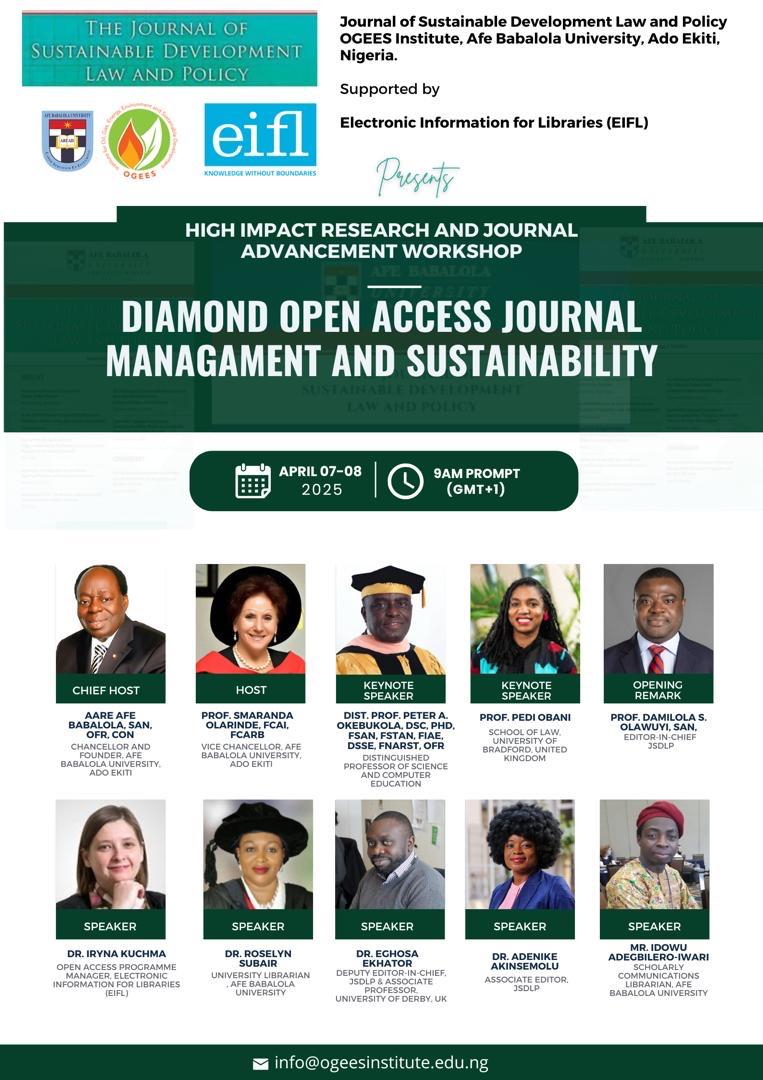
by Legalnaija | Apr 22, 2025 | Blawg
The skincare industry in Nigeria has expanded significantly, and many consumers rely on vendors’ recommendations when purchasing skincare products. Some vendors act as informal skincare consultants and, therefore, they recommend products based on customers’ needs or desires confidently. However, when these recommendations do not work as recommended or lead to skin damage, the customers often blame the vendors. This article examines the vendors’ liability briefly in such a situation.
Under Section 14(1) of the Sale of Goods Act, where a buyer makes known to the seller the particular purpose for which a product is required and relies on the seller’s skill, knowledge or judgment, there is an implied condition that the goods shall be reasonably fit for such purpose. For instance, if a vendor recommends a product for acne treatment and it causes severe irritation, the vendor shall be liable for breaching this implied condition of fitness for purpose.
The Court of Appeal in Afrab Chem Ltd. v. Owoduenyi held that a seller may be liable if a product does not serve its intended purpose as communicated to the buyer. Additionally, Section 131 of the Federal Competition and Consumer Protection Act 2018 provides that goods sold to consumers must meet their intended purposes, good quality, usable, durable and free from defects.
Section 14(2) of the Sale of Goods Act states that goods sold must be of merchantable quality. In other words, the goods should be safe, effective, and free from any defect or encumbrance. Therefore, if a vendor sells a face cream or body lotion that is expired or contaminated, this could constitute a breach of this implied warranty. Consequently, a consumer can maintain an action and seek redress against the vendor for selling a product that is not fit for the stated purpose or unmerchantable.
But it is essential for consumers to note that where a product is sold under a patent or trade name, example ABC body lotion, the vendor will not be held liable if the consumer did not get what he likes or if it leads to damage. The pretty safe assumption of the law is that when you’re buying a product under its patent or trade name you’re aware of what you’re buying and, as such, you shall bear the consequences of your choice. In Bristol Tramways & Carriage Co Ltd v. Fiat Motors Ltd, the court held thus: “if a man orders, in express terms, an article known by a patent or trade name under that name, and he gets it, he cannot complain that it does not answer some specific purpose for which he wanted it, even though he told the vendor before he ordered the purpose for which he required it.”
Apart from contractual obligations, skincare vendors in Nigeria can be liable under the law of torts, particularly for negligence and misrepresentation. In celebrated case of Donoghue v. Stevenson, the House of Lords established the principle that sellers owe a duty of care to consumers. The authority of Okwejiminor v. Gbakeji reaffirmed that manufacturers and sellers can be held liable for negligence when their product causes harm to consumers. But to establish negligence in such a situation, the consumers must prove the following ingredients:
- Duty of Care: The vendor owed a duty to provide a safe and appropriate product.
- Breach of Duty: The vendor failed to exercise reasonable care in recommending the product.
- Causation: The breach caused the consumer harm (example, skin damage).
- Damage: The consumer suffered actual loss or injury.
Misrepresentation occurs when a skincare vendor makes false, misleading, or exaggerated claims about a particular product. Example: If a vendor falsely claims that a product is “100% natural” or it has a “lighting or whitening effect” but it turns out to be otherwise or contains harmful chemicals, this could amount to misrepresentation and, as such, consumers may have a right to sue for damages. Similarly, Section 132(2) of The Federal Competition and Consumer Protection Act makes it categorically clear that a consumer can return the goods he/she found to be unusable or not fit for its intended purpose within three months. The vendors are also mandated to either repair or replace the goods or refund the price paid by the consumer for the goods.
In conclusion, the liability of the skincare vendors in Nigeria depends on contractual obligations, tortious liability and consumer protection law. The consumers enjoy protection of the law against the vendors where products sold are not fit for the intended purpose or where they are not of merchantable quality. Similarly, where the vendors misrepresent products or sell them in violation of the provisions of the Federal Competition and Consumer Protection Act, they shall be held liable for any damage caused by their act. Therefore, the skincare vendors ought to be cautious and ensure that their recommendations are accurate and that products meet the fitness for purpose and merchantability requirements. However, where products are sold under their patent or trade names, the vendors shall not be held liable for anything.
Written by Musbahu Yahaya Rabiu, a graduate of the Faculty of Law, Bayero University Kano, and a bar aspirant. He can be reached for corrections or constructive criticism at 08107882404 or musbahuyahayarabiu@gmail.com
References
Statutes:
Sale of Goods Act
The Federal Competition and Consumer Protection Act
Judicial Authorities:
Afrab Chem Ltd. v. Owoduenyi (2014) LPELR-23613 (CA)
Bristol Tramways & Carriage Co Ltd v. Fiat Motors Ltd (1910)
Donoghue v. Stevenson [1932] AC 562
Okwejiminor v. Gbakeji (2008) 5 NWLR (Pt. 1079) 172

by Legalnaija | Apr 19, 2025 | Blawg
WHO BEARS THE LOSS BETWEEN SELLER AND BUYER? LEGAL IMPLICATIONS OF DAMAGED GOODS IN SUPERMARKETS BEFORE PAYMENT
In modern retail settings, particularly self-service supermarkets, customers routinely handle goods before purchasing them. But what happens when a customer accidentally damages an item before payment? This article examines the legal implications of such scenarios and argues that the loss lies with the supermarket owners. This is based on the principle that the display of goods is not an offer, but merely an invitation to treat, and that ownership and risk remain with the seller until a contract is entered.
Under contract law, a distinction exists between an offer and an invitation to treat. An offer, when accepted, creates a binding contract. An invitation to treat merely invites negotiation or expression of willingness to enter into a contract. This principle was initially established in Pharmaceutical Society of Great Britain v Boots Cash Chemists, where the court held that the display of goods on shelves constitutes an invitation to treat. The customer makes an offer by presenting the goods to the cashier, and a contract is only formed upon the cashier’s acceptance—by scanning the product and collecting payment. The authority of Lasky v. Economy Grocery Store is also instructive here.
This concept is equally recognised under Nigerian law. Although no direct Nigerian case mirrors Boots and or Lasky, the principles of contract law, as contained in the Sale of Goods Law of Lagos State 2003 and the Sale of Goods Act 1893, adopt similar rules. Sections 17 and 18 of the Act emphasize that ownership passes when the parties intend it to pass—often at the point of sale.
In Nigeria, ownership and risk generally pass to the buyer when a contract is concluded, unless the parties intend otherwise. Until that point, goods displayed in a supermarket remain the property—and risk—of the seller. Section 20 of the Sale of Goods Act provides that goods remain at the seller’s risk until the property passes to the buyer. Therefore, if damage occurs before payment, no contract exists, and the risk remains with the seller.
While the general rule absolves the customer of liability for accidental damage, it is essential to note the following exceptions:
1. Negligence or Intentional Damage: If a customer damages an item through negligence—for example, carelessly handling fragile goods—they may be liable in tort. The establishment of tort of negligence requires the existence of a duty of care, breach of the duty, and damage as a result of the breach. In such cases, the supermarkets could recover damages.
2. “You Break It, You Buy It” Policies: Many retailers display signs warning customers that they are responsible for damaging goods. However, for such policies to be legally binding, they must meet the criteria for incorporation of terms into a contract. In other words, the supermarkets must exempt themselves from liability while making the contract through what is known as exemption clause. But such a clause must be made clearly to the understanding of buyers. In Thornton v Shoe Lane Parking, the court held that contractual terms must be brought to the notice of the customer before the contract is formed. Note that since no contract exists at the time of accidental damage, such notices may not suffice unless the customer is clearly aware and agrees in advance.
From both English and Nigerian legal perspectives, goods displayed in a supermarket constitute an invitation to treat, not an offer. Therefore, ownership and its necessary risk remain with the seller until a contract is formed at the point of sale. Unless the customer has acted negligently or recklessly, they are not liable for accidentally damaging items before purchase. This understanding ensures fairness in commercial dealings and places the burden of loss appropriately on the business owner who retains control and ownership of the goods.
It is essential to however note that, given that the risk lies with the supermarkets until payment is made, the owners should take measures to mitigate potential losses, such as taking out retail insurance to cover accidental damage, securely displaying fragile items, offering customer guidance or supervision in sensitive areas, and using clear, well-communicated signage—though such warnings alone may not be sufficient to impose liability on customers.
Written by Musbahu Yahaya Rabiu, a graduate of the Faculty of Law, Bayero University Kano, and a bar aspirant. He can be reached for corrections or constructive criticism at 08107882404 or musbahuyahayarabiu@gmail.com

by Legalnaija | Apr 16, 2025 | Blawg

The Nigerian Bar Association Section on Business Law (NBA-SBL) is pleased to announce the 19th edition of its flagship event, the International Business Law Conference, set to take place from July 2nd to 4th, 2025, at Harbour Point, Victoria Island, Lagos.
This year’s conference, themed “The Future of Business Law in an Intelligence Age”, will bring together leading legal minds, policymakers, and business professionals to explore the evolving intersection of law, technology, and artificial intelligence. As artificial intelligence and digital transformation redefine industries globally, the legal profession must evolve to address new challenges, including regulatory frameworks, data privacy, ethical considerations, and liability issues.
This conference will provide a critical platform for discussing the legal implications of AI-driven business models and strategies for legal practitioners to remain ahead of the curve. Speaking on the significance of this year’s theme, Ms. Solape Peters, Chair of the Conference Planning Committee (CPC), stated: “The intelligence age presents both opportunities and challenges for business law. As AI continues to reshape industries and automate decision-making processes, lawyers must rethink traditional legal frameworks to ensure fairness, accountability, and compliance in an increasingly digital world.
This conference is designed to equip legal practitioners and business leaders with the knowledge and tools to navigate these changes effectively Mrs Ozofu Ogiemudia; Chair of the NBA-SBL, emphasized the broader impact of the event: “The NBA-SBL International Business Law Conference has consistently set the agenda for progressive legal discourse in Nigeria and beyond. This year’s theme is particularly timely, as AI and automation rapidly disrupt traditional business and legal landscapes. Our goal is to provide a platform for thought leadership, meaningful dialogue, and actionable insights that will help shape the future of business law in Nigeria and beyond.”She said.
#NBASBL2025
#Legalnaija
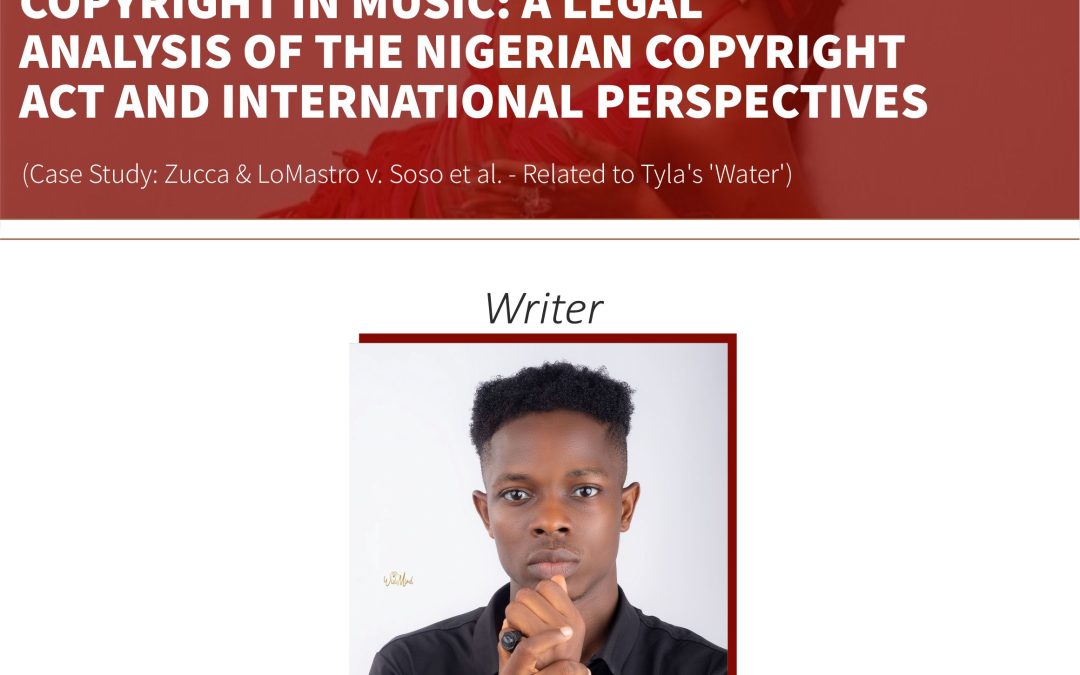
by Legalnaija | Apr 2, 2025 | Blawg
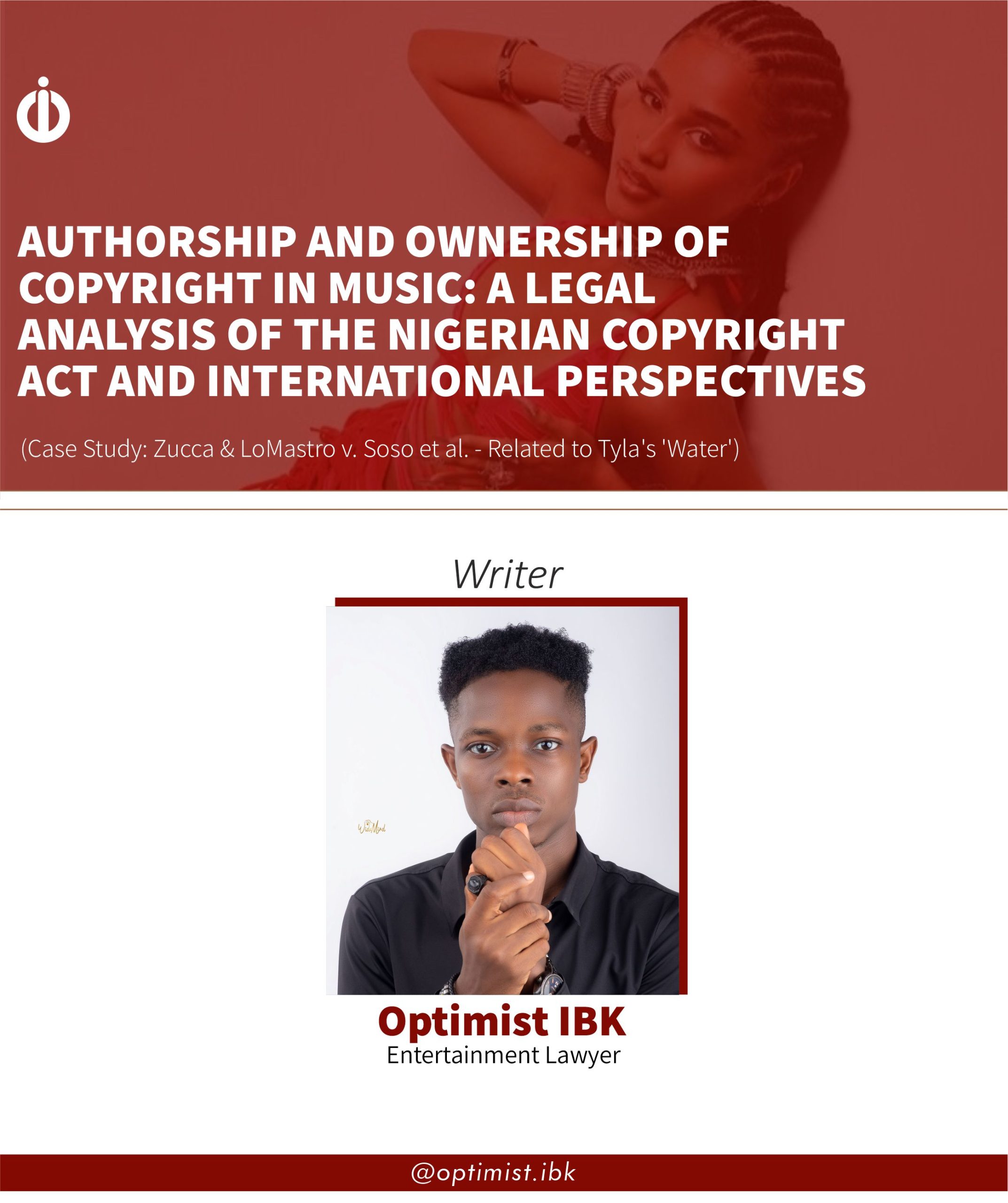
Authorship and Ownership of Copyright in Music: A Legal Analysis of the Nigerian Copyright Act and International Perspectives
(Case Study: Zucca & LoMastro v. Soso et al. – Related to Tyla’s ‘Water’)
Abstract
This article is dedicated to Music Business for Africa and Ivory and Black LP – 2024. As a student of MBA for Africa, we were tasked with drafting a producer agreement, which led to a critical debate on whether copyright in music belongs to the creator or the funder. While many argued for the funder, my academic research and the Copyright Act support the view that the creator owns the copyright unless otherwise agreed. A litigation expert pointed out that since the Nigerian Copyright Act does not expressly resolve this issue, it would be left to the courts to determine ownership.
While preparing this article, I encountered the lawsuit Olmo Zucca & Jackson LoMastro v. Sammy Soso, Tyla Seethal, and Sony Music Entertainment. This lawsuit illustrates the potential for confusion arising from unclear definitions of ‘author’ in copyright law, particularly in a rapidly growing music industry.”
The Nigerian music industry has witnessed exponential growth, with platforms like Spotify reporting a 49% increase in music exports over the past three years and a N58 billion payout to Nigerian artists in 2024 alone[1]. This surge underscores the critical need for clear copyright definitions to protect stakeholders’ rights and foster continued investment. However, ambiguities in the Nigerian Copyright Act, particularly concerning the definition of “author” in musical works and sound recordings, have led to disputes over ownership. The recent U.S. lawsuit involving producers Olmo Zucca and Jackson LoMastro against artist Sammy Soso, fellow artist Tyla Seethal, and Sony Music Entertainment highlights the complexities surrounding authorship and ownership in the music industry.
Introduction
Copyright law serves as the bedrock for protecting creative works, granting creators exclusive rights to reproduce, distribute, and adapt their creations. In the realm of music, two primary components are subject to copyright: the musical composition (encompassing melody, harmony, and lyrics) and the sound recording (the fixed embodiment of a performance). Understanding the delineation of rights between these components is essential for artists, producers, and investors. The Nigerian Copyright Act of 2022 outlines these protections but presents ambiguities, particularly in defining the “author” of a sound recording. This lack of clarity can lead to disputes over ownership, as evidenced by recent international legal battles. This article aims to clarify the complexities surrounding authorship in Nigerian copyright law by comparing international legislative frameworks, including the UK Copyright Act, the U.S. Copyright Act, and the Berne Convention. It also highlights the need for legislative reform to align with global standards and ensure adequate protection for music creators.
Authorship and Ownership in Musical Works
The concept of “authorship” is pivotal in determining copyright ownership. Generally, the author is the individual who translates an idea into a fixed, tangible expression. In musical works, this typically refers to the composer or songwriter who creates the melody and lyrics. According to the Nigerian Copyright Act, the author of a musical work holds the initial copyright, granting them exclusive rights to reproduce, publish, and perform the composition. These rights can be transferred or licensed through formal agreements, allowing for flexibility in commercial exploitation.
Authorship and Ownership in Sound Recordings
Determining authorship in sound recordings is more complex. The Nigerian Copyright Act [2] defines the author of a sound recording as “the person by whom the arrangements for the making of the sound recording were made.” This definition is ambiguous, potentially encompassing producers, record labels, or financiers who oversee the recording process. In practice, ownership of the sound recording, often referred to as “master rights,” typically resides with the producer or the entity that financed the recording, unless otherwise stipulated by contract. This aligns with practices in other jurisdictions, such as the United Kingdom, where the producer is recognized as the author of the sound recording.
Importantly, in musical works, the composition (melody and lyrics) is distinct from the sound recording (the performed and recorded version of the composition). The author of a musical composition is typically the songwriter or composer, while the author of a sound recording is usually the producer or entity responsible for its creation. However, in many cases, artists, producers, and contributors may share ownership of the master recording, unless agreements specify otherwise. This principle is evident in global copyright laws, including the U.S. Copyright Act and the UK Copyright, Designs and Patents Act 1988.
Case Study: Zucca & LoMastro v. Soso et al.
A recent lawsuit filed in the United States District Court for the Central District of California highlights this ongoing battle. Producers Olmo Zucca and Jackson LoMastro have taken legal action against Samuel Awuku (professionally known as Sammy Soso), artist Tyla Seethal, and Sony Music Entertainment, alleging that their contributions to a song recorded in March 2023 were wrongfully diminished.
According to the lawsuit, Zucca and LoMastro were full producers in the session, creating key instrumental elements, yet they were not credited or compensated fairly. Instead, Awuku allegedly took sole producer credit, secured a deal without informing them, and allocated them less than their rightful share of royalties. Despite being listed as co-authors in the song’s copyright registration, they were excluded from negotiations and denied proper recognition.
This case underscores a critical debate in music copyright law: who truly owns a sound recording—the contributors who shape its creative direction or the party who takes control of its commercial release? As the industry grapples with these questions, this lawsuit serves as a timely case study on the intersection of authorship, ownership, and producer rights in modern music production.
International Perspectives on Copyright Authorship
Internationally, copyright laws exhibit variations in defining authorship and ownership:
- United Kingdom (UK) Copyright Act
- UK Copyright[3] – Defines the producer (person arranging for the recording) as the author of the Sound Recording. Authorship of work in relation to a work, means the person who creates it. The person shall be taken to be- in the case of a sound recording, the producer.
- Under UK law, the producer (the person arranging for the recording) is recognized as the author of a sound recording. This is consistent with international conventions such as the Rome Convention and the WIPO Performances and Phonograms Treaty (WPPT).
- United States Copyright Act
- The U.S. Copyright Act[4] defines a sound recording as “a work that results from the fixation of a series of musical, spoken, or other sounds.” However, it does not explicitly define the “author” of a sound recording. Instead, authorship is determined by factors such as:
- Creative control over the recording process
- The role of the producer in shaping the final product
iii. Whether the recording was created as a “work made for hire”
- The U.S. case Community for Creative Non-Violence v. Reid (1989) [1] established that an author is “the person who translates an idea into a fixed, tangible expression entitled to copyright protection.” This definition supports the argument that creators, rather than funders, should hold copyright ownership.
These differences underscore the necessity for clear contractual agreements to delineate rights and prevent disputes.
Other Laws that Influence the Nigerian Copyright Act
The Nigerian Copyright Act 2022 was influenced by international treaties, including:
- Berne Convention (1886, as amended): Recognizes authors’ rights and provides automatic protection.
- WIPO Copyright Treaty (1996): Addresses digital rights and piracy concerns.
- TRIPS Agreement (1994): Sets minimum copyright standards under WTO regulations.
However, despite these influences, the Act lacks clarity on the definition of authorship in sound recordings, leading to misinterpretations and potential legal disputes.
Defining Authorship in Music
- Definition of Sound Recording
- A sound recording refers to a fixation of sounds that can be perceived and reproduced. Under the Nigerian Copyright Act 2022 [2], it is defined as: The fixation of a sequence of sounds capable of being perceived aurally and of being reproduced, but does not include a soundtrack associated with an audiovisual work.”
- Who is the Author of a Sound Recording?
- Authorship can be attributed to different parties, depending on the legal framework:
- Producer: Oversees recording, mixing, and mastering.
- Sound Engineer: If they significantly shape the final output.
iii. Record Label: If it finances and arranges the recording process.
- Independent Artist: If self-producing, they retain authorship.
- The Nigerian Copyright Act follows the UK model, leaning towards the producer as the author. However, this contradicts judicial interpretations in cases like Community for Creative Non-Violence v. Reid, where U.S. courts ruled that the person who fixes an idea in a tangible medium is the author.
Personal Definition of an Author in Copyrighted Work
An author in a copyrighted work is someone who has contributed something that is independently copyrightable. If a person’s work is not copyrightable, that person should not be considered an author. For someone else to claim ownership of a work, not authorship, there must be an agreement that transfers the right from the author to the other person, such as a composer and producer transferring their rights to a record label. I do not consider a financier an author; however, such a person can be the owner of the copyright work but not the author. Just because someone funds a musical work does not make them the author of that musical work.
Judicial Provisions as to Who is an Author
- Nigeria: Oladipo v. African Songs [5]
- Issue: Dispute over authorship and ownership of a musical composition.
- Ruling: The court recognized the songwriter as the copyright owner of the musical work, but the label owned the sound recording rights.
- This case primarily addressed the copyright ownership of musical compositions, not sound recordings. The case focused on the author of the composition (the songwriter/composer) rather than the ownership of the master recording (which is a separate copyrightable element in music). The ruling established that the author of a musical work is the person who created the original composition, which typically includes the songwriter or composer. This aligns with the definition of “author” under Section 51 of the Copyright Act (Cap C28 LFN 2004), which states that the author of a literary, musical, or artistic work is the person who created it.
- U.S.: Community for Creative Non-Violence v. Reid (1989) [6]
- Issue: Whether an independent artist’s work was a “work made for hire.”
- Ruling: The court ruled that the person who fixes an idea in a tangible medium is the author.
- This case is a key U.S. Supreme Court case that clarified the definition of an “author” under U.S. copyright law and the distinction between independent contractors and employees in copyright ownership.
- Key Ruling on “Author”:
- The Court held that the “author” of a work is the person who creates it unless it qualifies as a work made for hire under 17 U.S.C. § 101 of the Copyright Act of 1976.
- In the absence of a “work for hire” agreement, the independent creator (not the hiring party) is the owner of the copyright.
- The case does not specifically discuss sound recordings. However, its principle applies to the music industry.
- UK: Fisher v. Brooker (2009) [7]
- Issue: A musician claimed co-ownership of a song for contributing to the arrangement.
- Ruling: The court ruled that instrumental contributions do not automatically make someone a co-author.
- The case is a landmark UK copyright case concerning joint authorship and ownership rights in musical compositions.
- Key Ruling on “Author”:
The House of Lords ruled that Matthew Fisher, the organist of Procol Harum, was entitled to a share of the copyright in the song “A Whiter Shade of Pale” because his contribution (the organ solo) was significant and original.
The case reaffirmed that an author is the person who creates the original expression in a work under UK copyright law [8].
- The case focused on the musical composition (songwriting) rather than the sound recording. However, its principle applies to disputes over joint authorship in music.
Recommendations for Nigerian Copyright Law
Given the rapid growth of Nigeria’s music industry, it is imperative to address the ambiguities in the Copyright Act regarding authorship of sound recordings. Clarifying the definition of “author” to specify the roles of composers, producers, and financiers can mitigate disputes and foster a more transparent industry. Implementing standardized contractual practices that clearly outline ownership and royalty distributions will further protect stakeholders and encourage investment.
To resolve these issues, Nigeria must:
- Amend the Copyright Act to provide a clear definition of authorship in sound recordings, distinguishing between creators and financiers.
- Adopt contractual best practices from international jurisdictions to define ownership terms.
- Create a Special Tribunal for Entertainment Law for better interpretation of the law.
- Align with WIPO standards to ensure Nigerian music creators receive global recognition and protection.
Conclusion
My definition of an author is what I believe should be obtainable in the music industry, which is supported by some judicial provisions. The Nigerian Law defines the author of a photograph as the person who takes the photograph but fails to clearly state the author of a sound recording as the person who created it. As we continue to create sounds in the industry, I will continually advise that creators should always have a clear agreement between all the contributors of the musical works, and financiers should not regard themselves as the authors of musical works or sound recordings unless there is an agreement that transfers ownership to them. Split sheets and assignment agreements should be signed in musical works to avoid future disputes, as currently happening in the case of Olmo Zucca & Jackson LoMastro v. Sammy Soso, Tyla Seethal, and Sony Music Entertainment.
The burgeoning Nigerian music industry stands at a crossroads where legal clarity can either propel it to greater heights or hinder its progress. The recent lawsuit involving Zucca and LoMastro highlights the potential for disputes arising from ambiguous definitions of authorship and ownership. By refining the Copyright Act to provide clear definitions and encouraging comprehensive contractual agreements, Nigeria can ensure that its artists, producers, and investors operate within a framework that promotes fairness, creativity, and sustained growth.
References
- 2024 Loud & Clear report, by Spotify
- Section 108 (1) (d), Copyright Act 2023
- Section 9 UK Copyright, Designs and Patents Act 1988
- Copyright Act (17 U.S.C. § 101)
- Community for Creative Non-Violence v. Reid, 490 U.S. 730 (1989).
- Oladipo v. African Songs Ltd. (Suit No. LD/1138/73).
- Fisher v. Brooker, [2009] UKHL 41.
- (Copyright, Designs and Patents Act 1988, Section 9(1)
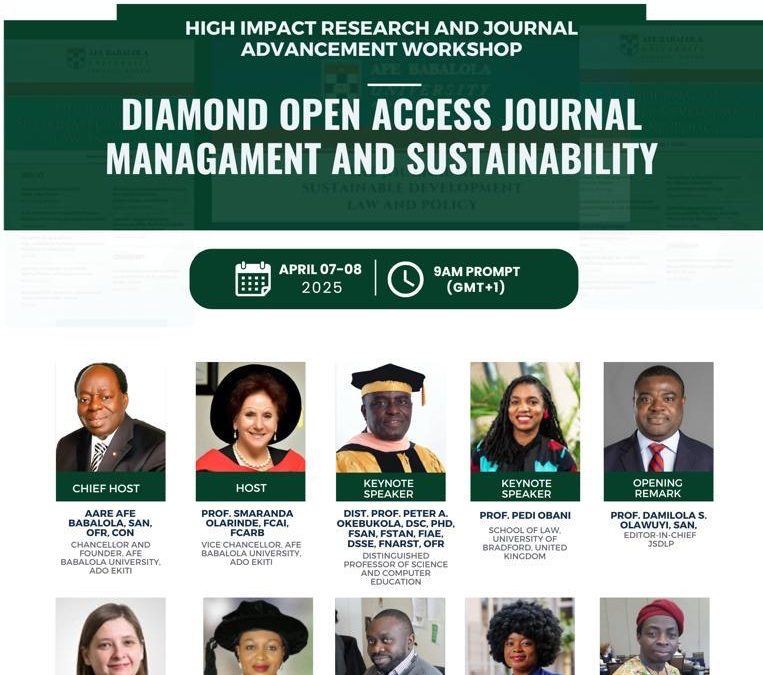
by Legalnaija | Mar 25, 2025 | Blawg
Save the Date: 2nd Diamond Open Access Workshop!
The Journal of Sustainable Development Law and Policy at Afe Babalola University, Ado Ekiti, Nigeria, is excited to invite you to its 2nd Diamond Open Access Workshop, supported by EIFL and Wellcome Trust.
Keynote Speakers:
– Distinguished Professor Peter Okebukola: Former Executive Secretary, National Universities Commission of Nigeria.
– Prof. Pedi Obani, PhD, FHEA: University of Bradford, UK.
Other featured speakers:
– Prof. Smaranda Olarinde
– Prof. Damilola S. Olawuyi, SAN, FCIArb
– Iryna Kuchma
– Eghosa Ekhator
– Dr. Roselyn Subair, CLN, FSMC
– Adenike Akinsemolu
– Idowu Adegbilero-Iwari
📅 Date: April 7-8, 2025 |
Time: 9:00 AM
📍 Venue: Alfa Belgore Hall, Afe Babalola University, Ado Ekiti
This event promises to be a dynamic exchange of knowledge on sustainable development, law, and policy. Mark your calendar and join us for two days of enriching discussions with leading experts in the field!
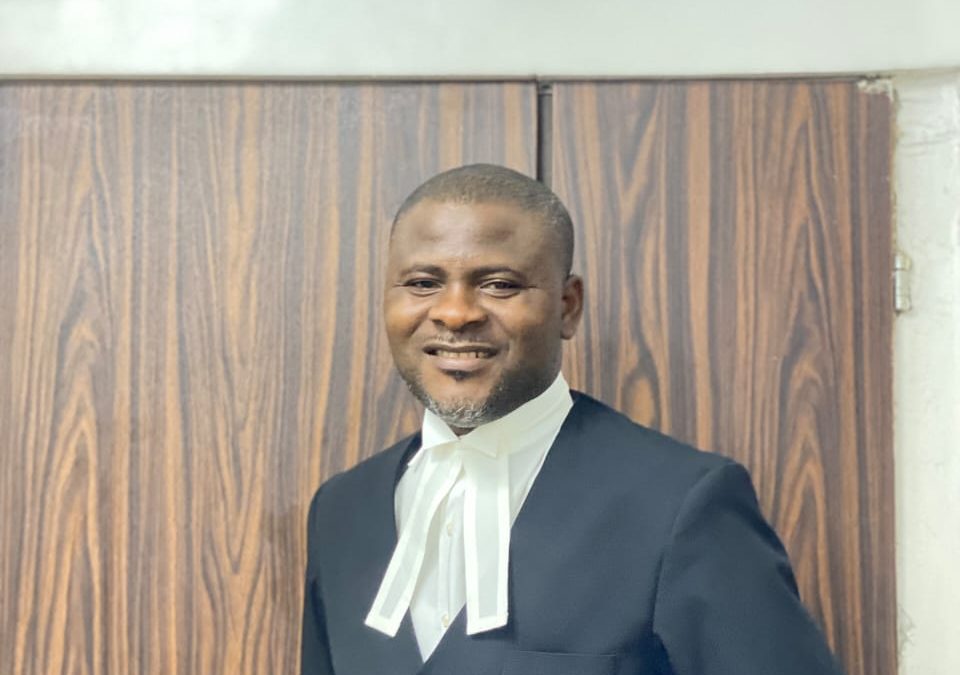
by Legalnaija | Mar 20, 2025 | Blawg
“The President Lacks Power To Suspend An Elected Governor, His Deputy And Members Of The House Of Assembly Under Section 305 Of The 1999 Constitution As Amended Because The Power To Remove A Governor And A Deputy Governor Is Enshrined In Sections 188 And 189 Of The 1999 Constitution Of The Federal Republic Of Nigeria As Amended And Same Can Only Be Exercised By The House Of Assembly Of A State And Not The President”
Since yesterday, I have been reading articles and listening to Lawyers and non-lawyers debating and arguing about the Constitutionality or otherwise of the powers of the President to suspend the Governor of Rivers state, his deputy and all other elected members of the Rivers State House of Assembly. While some have hinged their arguments on the provisions of Section 305 of the 1999 Constitution of the Federal Republic of Nigeria as amended, others, hinged theirs on the provisions of section 218 of the Constitution.
Furthermore, there is also another school of thought, that relied on the provisions of section 180 (1)(d) which provides thus: Subject to the provisions of this Constitution, a person shall hold the office of Governor of a state until- (d) he otherwise ceases to hold office in accordance with the provisions of this constitution.
It is quite regrettable and unfortunate that majority of Nigerians have been massively misled by both Lawyers and non-Lawyers that the President of the Federal Republic of Nigeria can hide under the provisions of Sections 180 (1) (d), 218 and 305 of the 1999 Constitution as amended to suspend an elected governor of a state, his deputy and other elected members of the House of Assembly. For the avoidance of doubt, no such powers exist under the 1999 Constitution as amended.
Premised upon the above, it is important to state that, the provision of Sections 180 (1) (d), 218 and particularly, section 305 of the 1999 Constitution as amended are so clear, plain and direct and do not require any ambiguous or imported interpretation. There is absolutely nothing in any of these Constitutional provisions that empowers the President to suspend or remove an elected Governor of a state, his deputy or the members of the House of Assembly.
As have been held in several authorities, not even Courts can amend the Constitution or even change the words. It is also a principle of interpretation that the language of the Constitution where clear and unambiguous, must be given its plain evident meaning and that a constitutional provision should not be construed so as to defeat its evident purpose. It is also settled law that provisions of the Constitution are not to be interpreted in isolation but that other provisions must be taken into consideration in the exercise. See the case of HON. MICHAEL DAPIANLONG & ORS vs. CHIEF (DR.) JOSHUA CHIBI DARIYE & ANOR (2007) LPELR-928(SC) at PP. 55-57, paras. D-A.
The Supreme Court in Marwa vs. Nyako (2012) 6 NWLR (pt.1296) 199 at 337 SC, restated that when interpreting the provisions of our Constitution, not only should the Court look at this Constitution as a whole, the provisions should be construed in such a way to justify the hope and aspirations of those who made strenuous efforts to provide us with a constitution to ensure good governance, but also to protect the rights of Nigerians who are the beneficiaries of the provisions of the Constitution, particularly to ensure durable democratic institutions.
From the clear, express and direct provisions of the 1999 Constitution as amended, the power to remove a governor and a deputy governor is contained in sections 188 and 189 of the Constitution and only exercisable by the House of Assembly and not the president or even our Courts can exercise such powers. While a member of the House of Assembly can vacate his seat or be recalled from the House of Assembly by the express provisions of sections 109 and 110 of the Constitution. Just like sections 188 and 189, the President lacks the powers to exercise these powers.
Consequent upon the above, it is illogical and highly unreasonable for anyone to submit that the President can suspend an elected governor, deputy governor and members of the House of Assembly.
Finally, for those who have hidden under the omnibus provisions of section 180 (1) (d) to argue that the president can suspend an elected governor and his deputy, I must humbly refer you to the authority of All Progressives Congress (APC) vs. Peoples Democratic Party (PDP) & Ors (2022) LPELR-58952(CA) at PP. 42-44 paras. C-C, wherein it was held thus: Now, the offices of the Governor of a State and Deputy Governor of that State are creations of the Constitution, which is the grundnorm that regulates the conduct of government. Thus, Section 176 (1) of the Constitution stipulates that, there shall be for each State of the Federation, a Governor. The qualifications of a person to be elected Governor of a State are laid down in Section 177 of the Constitution. Where a person qualifies to contest for the Governor of a State, he will be declared duly elected if he satisfies the requirements of Section 179(1) (a) and (b), or 179(2) (a) and (b), or 179(3) (a) and (b), or 179(4) (a) and (b) of the Constitution. The equivalent provisions of the Constitution relating to the office of Deputy Governor of a State are Sections 186 and 187 (1) and (2). In the instant case, the 3rd and 4th Respondents satisfied the requirements of Section 179(2) (a) and (b) of the 1999 Constitution and were accordingly declared duly elected and sworn in on 29/5/2019. The 1st Respondent has hot contested nor denied those facts. It should be noted that the 3rd and 4th were to occupy the offices of Governor and Deputy Governor of Ebonyi State for a term of four (4) years from the 29th day of May, 2019. See Section 180 (2) of the 1999 Constitution (as amended). However, by Section 180(1) of the Constitution, they shall not vacate or deemed to have vacated the office of Governor until: (a) when their successors in office take oath of that office; or (b) the date when their resignation from office take effect; or (d) They otherwise cease to hold office in accordance with the provisions of the Constitution. It is apparent from the above stated provision of the Constitution, that their term of office shall end when their successors in office have been validly elected and sworn in; or where they die during the subsistence of their terms of office; or where they resign; or they otherwise cease to hold office. Section 180(1) (d) appears to be a general or omnibus provision to accommodate other circumstances, which may truncate or terminate the tenure of four (4) years prescribed by the Constitution. It is my view that paragraph (d) of subsection 1 to Section 180 of the Constitution is meant to accommodate a situation where the Governor may be removed from office pursuant to Section 188 and 189 of the Constitution (supra).
See also the decision of Engineer David Nweze Umahi & Anor vs. Peoples Democratic Party (PDP) & Ors, (2022) LPELR-58994(CA) at PP. 67-68, paras. C-F, it was held thus: It should be noted that the Appellants were to occupy the offices of Governor and Deputy Governor of Ebonyi State for a term of four (4) years from the 29th day of May, 2019. See Section 180 (2) of the 1999 Constitution (as amended). However, by Section 180(1) of the Constitution he shall not vacate or be deemed to have vacated the office of Governor until: (a) when his successor in office takes oath of that office; or (b) the date when his resignation from office takes effect; or (d) he otherwise ceases to hold office in accordance with the provisions of the Constitution, ?It is apparent from the above stated provision of the Constitution, that his term of office shall end when his successor in office has been validly elected and sworn in; or where he dies during the subsistence of his term of office; or where he resigns; or he otherwise ceases to hold office. Section 180(1) (d) appears to be a general or omnibus provision to accommodate other circumstances, which may truncate or terminate the tenure of four (4) years prescribed by the Constitution. It is my view that paragraph (d) of subsection 1 to Section 180 of the Constitution is meant to accommodate a situation where the Governor may be removed from office pursuant to Section 188 and 189 of the Constitution (supra). In the instant case, the case of the 1st Respondent leading to the decision of the Court below and subject of this appeal is that, the Appellants having decamped or cross-carpeted from the 1st Respondent’s platform on which they won the election, to the 3rd Respondent, they are deemed to have vacated their offices. It should be noted that by Section 187(2) the issue of inter alia, tenure of office applies to the office of Deputy Governor of a State.
In conclusion, an elected governor and his deputy can only be removed pursuant to the provisions of sections 188 and 189 of the Constitution only by the House of Assembly of a state. Furthermore, it must be noted that members of the House of Assembly can vacate their seats pursuant to sections 109 or be recalled pursuant to section 110 of the Constitution. The President therefore lacks powers under section 305 of the Constitution to suspend the Governor, Deputy Governor or members of the House of Assembly.
Ojonimi S. Apeh, Esq.
(Notary Public)
08064465541
apehnimibrisk@gmail.com
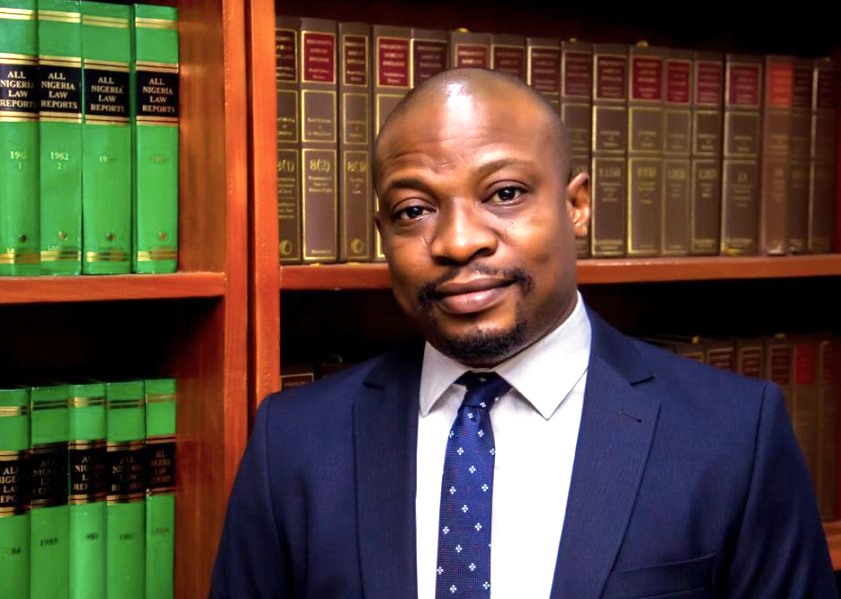
by Legalnaija | Mar 18, 2025 | Blawg
Accuracy of Employees Records: Spotting some data protection issues from the facts of Ologe v Corporate Affairs Commission as decided by the National Industrial Court | By Olumide Babalola
Coincidentally, I penned this article today – 18 March 2025) – a day the Nigerian Bar Association Data Protection Committee (which I modestly chair) holds its inaugural webinar titled “Data Protection in Nigeria: Milking A New Practice Area” to further sensitize lawyers on why they should take issues of data protection more seriously.
In his characteristic manner, Mr. Folabi Kuti, SAN, one of the foremost labour and employment lawyers in our country had shared an interesting decision of the National Industrial Court between Olumide Abayomi Ologe and Corporate Affairs Commission & Anor. (unreported Suit No. NICN/ABJ/375/2024) where the court ruled on the effect of a letter of promotion which was delivered to an ex-employee two years after his resignation. Outside the labour law issues of facts and law, I spotted some quick lessons in data protection from the facts thus:
The Importance of Rectifying Employee Records under the Nigeria Data Protection Act 2023
The Claimant resigned in December 2022, his records ought to have been rectified to reflect his status as ex-employee and his file moved to the appropriate storage section/folder whether manual or electronic. The Nigeria Data Protection Act 2023 (NDPA) mandates organizations to uphold the rights of individuals regarding the processing of personal data, in this case storage. One of the key rights under this Act is the right to rectification (section 34(1)(c), which allows individuals to ensure that their personal data is accurate, complete, and up-to-date.
In the case of an employee who resigns, it is crucial for the employer to update the individual’s records in a timely manner. For instance, if an employee, such as the Claimant, resigns in December 2022, their employment status should be immediately reflected in both manual and electronic records. This is not just a matter of internal housekeeping; it’s a legal obligation to ensure that the employee’s status is accurately documented and that their data is properly handled.
The NDPA envisions that once an employee ceases to be part of an organization, their personal data should no longer be classified as “active” in the organization’s system. The employer must ensure that the former employee’s file is moved to the appropriate storage section or folder—whether in physical archives or electronically. Failure to do so could violate the employee’s right to rectification, which could lead to legal consequences for the organization as a result on the ensuing confusion.
Moving the data to the correct storage ensures the security and privacy of the ex-employee’s data while complying with the principles of data minimization and purpose limitation – these are obligations provided in the Act. Keeping outdated or incorrect employment information can not only result in potential data breaches but also exposes the organization to legal liabilities for non-compliance as well as payment of entitlements to ex-employees as claimed in Ologe’s case.
It is advised that organizations must prioritize the rectification of personal data records and ensure that any data about former employees is appropriately updated, secured, and archived in accordance with the Nigeria Data Protection Act 2023. This step is essential not only for legal compliance but also to protect employees privacy and data subjects rights.
The Principle of Accuracy Under the NDPA: Consequences of Misleading Employment Records
The NDPA provides certain principles designed for entities to ensure that personal data is handled responsibly. One of the principles is the “accuracy” principle (section 24(1)(e), which mandates that personal data must be accurate, complete, and kept up-to-date. This principle is fundamental in safeguarding individuals’ rights to have their data correctly represented, and it holds particular significance in the context of (current or past) employee records.
In the case of a Claimant who resigned in December 2022, his employment status and position within the organization should have been promptly updated to reflect his actual status as an ex-employee. However, an issue arose when the employer issued a letter of promotion to the Claimant – after two years of his resignation, recognising to him as a “Director” rather than his correct position of “Principal Manager” before resignation. The employer explained its position in court, arguing that the Claimant’s last official role was that of Principal Manager and that the Claimant ought not to have countenanced the letter and its contents. This discrepancy raises concerns under the NDPA’s accuracy principle.
The principle of accuracy mandates that all personal data, including employment records, must be kept precise and free from errors. Referring to an individual by a title that does not correspond to their actual position creates misleading information and violates the obligation to maintain accurate records. In this case, addressing the Claimant as a “Director” in the promotion letter, despite their last position being “Principal Manager,” represents an inaccuracy in the personal data of the Claimant, which led to the ex-employee’s demand for arrears of salaries and entitlements as a director. The error in the promotion letter also highlights a failure on the part of the employer to update and rectify the Claimant’s records in a timely manner following his resignation. According to the NDPA, an organization must ensure that any personal data held, such as job titles, is both accurate and up-to-date. Failure to amend such records can be interpreted as non-compliance with the data protection dictates.
Conclusion
Concluding, the failure to correct the Claimant’s employment records, particularly in addressing him as a “Director” in a letter written in January 2024 – two years after his resignation, is misleading as it constitutes a clear violation of the rectification and accuracy principles under the Nigeria Data Protection Act 2023. The Act mandates that personal data must be accurate, complete, and kept up-to-date, especially when an individual’s employment status changes. By continuing to refer to the Claimant by an incorrect job title, the employer has not only breached the legal obligation to rectify and maintain accurate records but has also undermined the integrity of the data processing practices. It is crucial for organizations to prioritize timely updates and ensure that all personal data, including employment titles and statuses, reflect the true and current state of affairs to remain compliant with the NDPA and protect the rights of the data subject. As a result of the misleading letter, the employee can maintain an action under the Nigeria Data Protection Act 2023 especially since he has suffered some injury (financial, psychological, emotional) by the employers’ processing activities.

by Legalnaija | Mar 13, 2025 | Blawg

Abisoye Coker Appointed as Alternate Chair of the Fundraising Sub-Committee for NBA Lagos Law Week 2025
The Nigerian Bar Association (NBA) Lagos Branch has appointed Abisoye Coker as the Alternate Chair of the Fundraising Sub-Committee for the upcoming NBA Lagos Law Week 2025, scheduled for June 14th – 20th, 2025. This year’s theme, “Reimagining the Practice of Law: Ethics, Innovation, and the Future of Legal Services,” will explore the intersection of law, technology, and policy, emphasizing the evolving role of legal practitioners in a rapidly shifting global landscape.
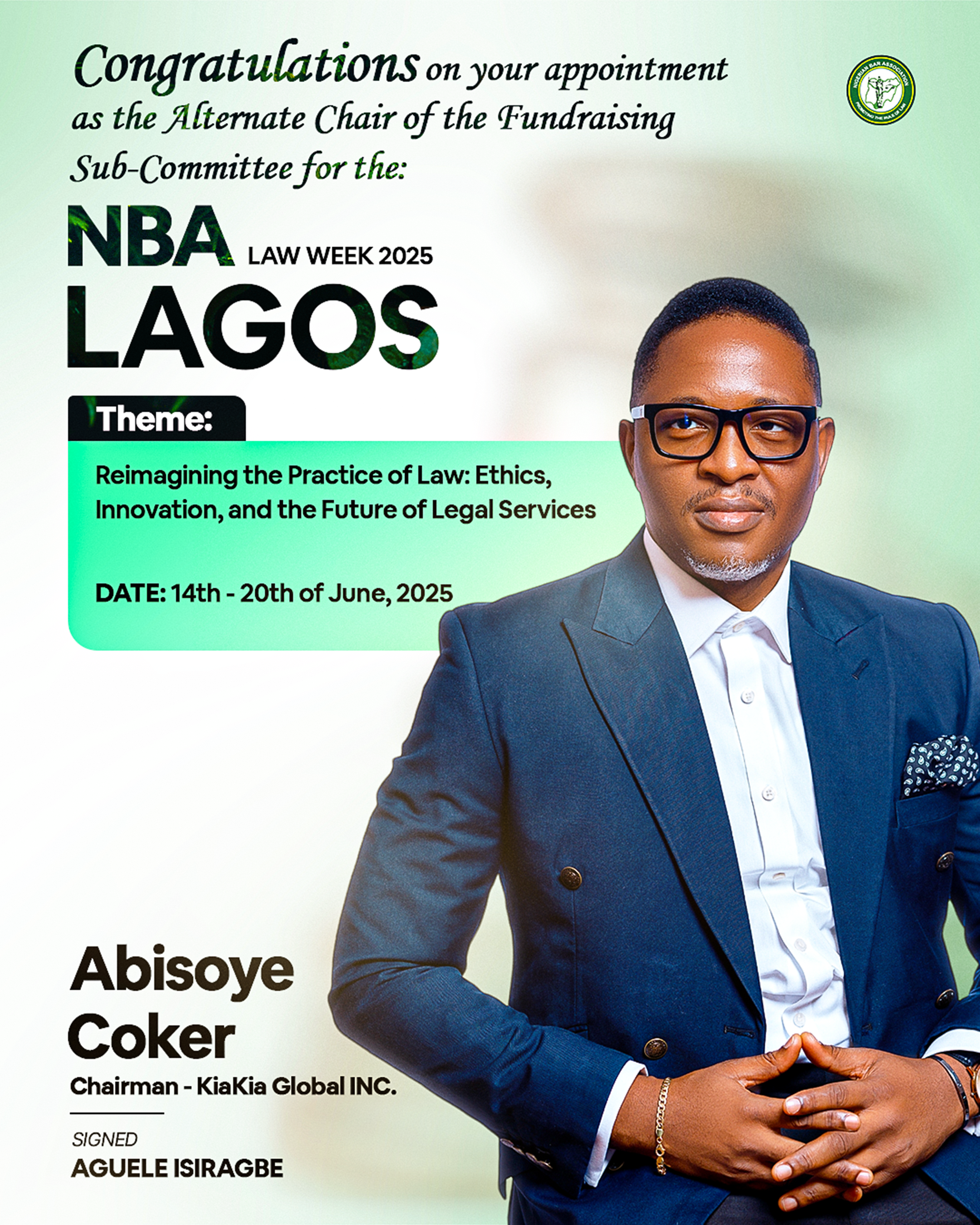
A seasoned corporate lawyer, entrepreneur, and financial policy advocate, Abisoye chairs the board of KiaKia Global Inc., a leading payments solutions company, and also serves as the Managing Director of KiaKia FX UK, the group’s payments systems technology and advisory firm. With a strong focus on FX policy reforms in Africa, he has established himself as a key thought leader in financial regulations and corporate governance.
Speaking on his appointment, Abisoye underscored the importance of innovation and adaptability in the legal profession, particularly in an era of fast-changing financial policies and regulatory frameworks. He noted that as global economic structures continue to evolve, legal practitioners must engage with emerging policies and technologies to remain effective, forward-thinking, and prepared for the future.
Amongst other topical discussions, NBA Lagos Law Week 2025 will feature a high-level roundtable discussion on the impact of the Central Bank of Nigeria’s (CBN) Foreign Exchange Reform Policies introduced in 2024.

by Legalnaija | Mar 6, 2025 | Blawg
Building a Thriving Legal Career: A Guide for Young Lawyer
Embarking on a career in law is as exciting as it is challenging. The legal profession offers immense opportunities for growth and impact, but success requires strategy, perseverance, and adaptability. Here are some key pieces of advice for young lawyers looking to build a fulfilling and thriving career:
1. Embrace Lifelong Learning
The legal landscape is constantly evolving with new laws, technologies, and societal changes. Stay ahead by consistently updating your knowledge. Attend seminars, enroll in continuing legal education (CLE) courses, and keep up with landmark cases. Remember, a well-informed lawyer is a valuable lawyer.
2. Find Your Niche
While it’s important to start with a broad understanding of law, identifying a specialty early on can set you apart. Whether it’s corporate law, intellectual property, criminal defense, or tech law, choose an area that aligns with your passion and skills. A niche focus makes you an expert, not just a generalist.
3. Build Strong Relationships
The legal field thrives on connections. Cultivate relationships with colleagues, mentors, and clients. Attend networking events, engage with your professional community, and never underestimate the power of a thoughtful follow-up email. Building a reputation for being approachable and reliable will open doors.
4. Develop Your Soft Skills
Technical legal knowledge is essential, but don’t overlook the importance of soft skills like communication, negotiation, and emotional intelligence. Effective listening and clear articulation are key to understanding clients’ needs and persuading others, whether in court or during negotiations.
5. Master Time Management
The legal profession can be demanding, with tight deadlines and high expectations. Learn to prioritize tasks, delegate when necessary, and avoid burnout. Tools like task managers, calendars, and time-tracking apps can be lifesavers.
6. Stay Ethical
Integrity is the backbone of a lasting legal career. Uphold the highest ethical standards in all your dealings. Trust is hard to build but easy to lose, and your reputation as a lawyer will precede you in all professional interactions.
7. Leverage Technology
The legal industry is rapidly embracing technology. Familiarize yourself with legal research tools, case management software, and emerging fields like artificial intelligence in law. Being tech-savvy will make you more efficient and competitive.
8. Seek Mentorship
Having a mentor can provide invaluable guidance as you navigate the complexities of the legal world. A mentor can offer insights into career decisions, introduce you to their network, and provide a sense of direction when challenges arise.
9. Take Care of Yourself
The demands of a legal career can take a toll on your well-being. Prioritize self-care, maintain a healthy work-life balance, and don’t hesitate to seek help when needed. A happy, well-rested lawyer is a more effective lawyer.
10. Set Long-Term Goals
While focusing on immediate tasks is important, always keep an eye on the bigger picture. Define what success looks like for you, whether it’s becoming a partner, starting your own practice, or advocating for social change. Regularly revisit your goals and adjust your strategies accordingly.
Starting out in law is a journey full of learning and growth. With dedication, resilience, and a focus on both personal and professional development, young lawyers can carve out a path to success and make a meaningful impact. Remember, every case you take on is an opportunity to learn and grow. Your future in law is as bright as you make it!
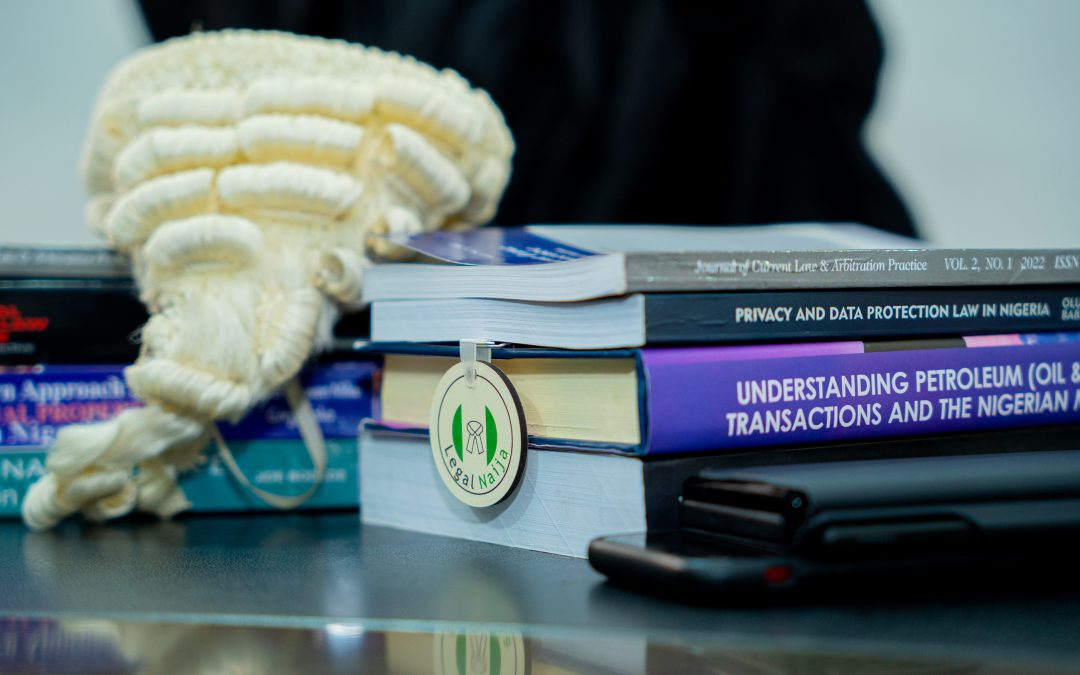
by Legalnaija | Mar 6, 2025 | Blawg, Book
The Legalnaija Bookstore is a hub for every lawyer, law student, and legal enthusiast looking to enhance their knowledge and skills. Whether you’re preparing for your next big case or expanding your expertise, we’ve got you covered with curated titles that deliver value at every level.
What You’ll Find in Our Store:
– Law Reports: Access essential judicial decisions to strengthen your case law research and arguments.
– Specialized Textbooks: Dive deep into areas like corporate law, criminal law, and intellectual property with expertly written texts.
– Practical Guides: Explore resources packed with templates, strategies, and procedural tips to navigate your legal journey with confidence.
– Statutory and Legislative Compilations: Stay ahead with books containing relevant Nigerian statutes, codes, and regulations.
– Insights on Emerging Trends: Get ahead of the curve with books on tech law, data privacy, and other evolving legal topics.
Why Legalnaija Bookstore?
– Stay Updated: Our collection ensures you’re always informed about the latest legal developments.
– Save Time: Find ready-to-use tools and guidance that make your work more efficient.
– Expand Your Expertise: Gain insights from seasoned professionals and specialized resources.
– Enhance Your Credibility: Build a legal library that reflects your professionalism and dedication.
Elevate your legal practice or studies with resources that add real value. Start building the library your career deserves today at [Legalnaija Bookstore](https://www.legalnaija.com/store).








